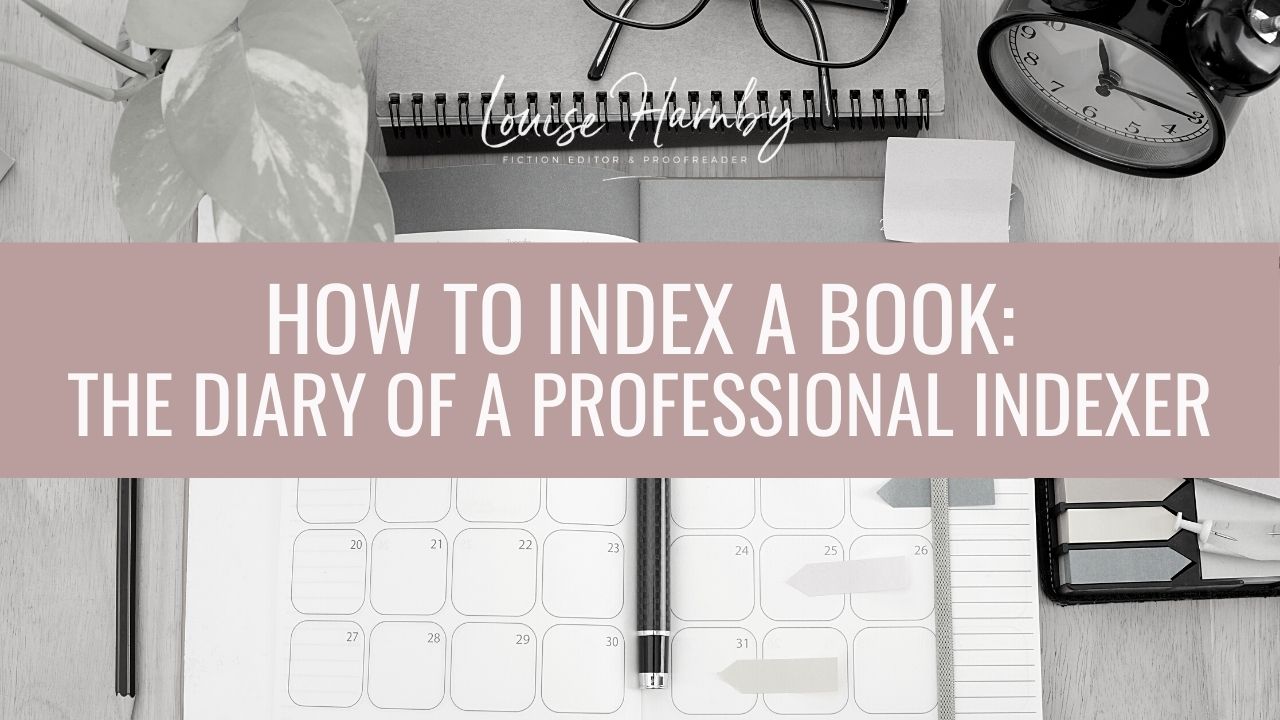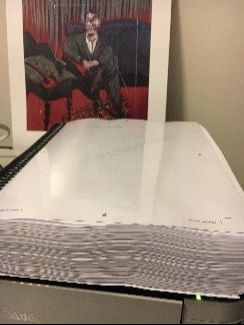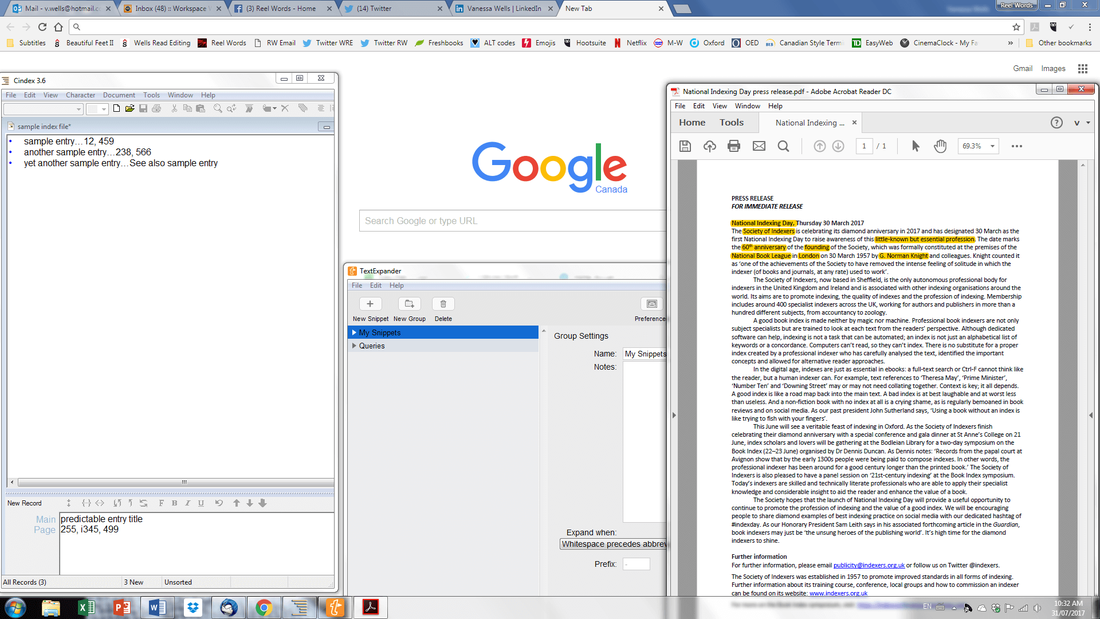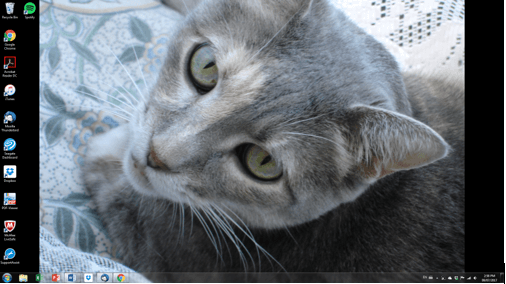|
Ever wondered how a professional book index is created? My colleague Vanessa Wells offers an honest and humorous glimpse into the world of a pro indexer – the challenges and the joys, and the 'sense of having created a beautiful thing'.
Let's take a peek in Vanessa's diary ...
I attended the Canadian national indexing conference in Montreal, where we – like most conference attendees – go to strengthen connections with colleagues and expand our professional knowledge. Since the indexing community in Canada is very small, this is a valuable investment and full of good people.
As a result of the conference, I’ve received a referral and am being hired by a university professor to write an index for a 220K-word anthology he’s editing with 22 chapters and almost as many contributors. It’s a ‘straightforward’ index of ‘names and titles’ which, of course, means that it’s both a name and subject index in reality. Yikes.
Against my usual policy, I agree to meet the professor in person, as the campus is close by and it would be faster than exchanging several emails. An excellent meeting results in ironing out expectations, discussing needs and agreeing we’re on the same page! It’s due July 26.
I send him my contract to review, and we discuss rates. Rate structure, I find from speaking to other indexers, is variable. Some people will work for $2/page; others charge much more. A figure I often hear is $5/page, but that definitely depends on your market – geographically and by genre, specialization, and timeline. An independent author writing a non-fiction trade book is not going to generate the same fee as a university-paid gig. Some indexers provide other means of calculating their fees, such as a flat project fee. I tell him my academic rate, and he agrees. I submit my invoice for a non-refundable 30% deposit, payable before work begins.
Proofs are due. They don’t arrive. They’re rescheduled by publisher for the 30th … While publishing timelines are often shifting (there’s a domino effect when a hitch arises), the end deadlines of proofreading and indexing are rarely budged.
So now I have to recalculate the number of hours and pages per day I’ll have to complete to meet the non-budging due date of July 26. Four days lost means Goodbye, weekends! for the duration.
It’s a long weekend here for #Canada150, our sesquicentenary. I’m so wiped from the previous month of conferences and making a second website for the new arm of my business that I take (most of) the weekend off. I can’t afford to get sick during this project. Self-care and all that.
Forgot I start a weekly course on Tuesday afternoons for the summer, with an appointment this morning. Will have to start tomorrow. Now that I’ve lost another 5 days, I’ll have not only to work weekends but very long days, everyday. My bad.
21 days to go: I begin the pre-read (see above photo) to start gathering my thoughts on how I’ll approach this behemoth. And I need at least 3 days at the end to edit the written index, so really I only have 18 days available.
I note there are A LOT of errors still in the MS. I judiciously email AU to double check that it’s been edited and that no other file is forthcoming. He confirms it has been copyedited … Sigh.
Re-install my $500USD indexing software on my new PC. Pay $39 for TextExpander, which is an online tool that lets you build a library of ‘snippets’, sort of like hot keys or macros, but it’s much simpler and faster. Using TextExpander for repeated, long index headings is making my life so much easier: it works pretty well with .ucdx files!
I’m already 50 pages behind. Indexing academic books is so much harder because you have to interpret the often-verbose language to get to the ideas (then re-edit them in your mind) and THEN start forming index relationships between the ideas on that and every other page.
Since there are almost two dozen authors in this anthology, I’m doing a lot of mental shifts. Why do I pine for indexes so much when they can be so draining?!? I’m being foiled by the very poor copyediting that was(n’t) done. I email the author-editor several times regarding his preferences for word options that I’m finding in the errata …
Working on a Saturday is particularly annoying when you hear other people having a great day off. Such is the freelance life.
Here’s how I start an indexing day. Wish I had more than one monitor and can’t believe I used to do this on a 15-inch one!
CINDEX software file open; Google to check MS info, with related sites and academic books on the subject; book PDF marked up with terms needing indexing; and TextExpander to cut down on keyboard strokes. For the time being, I just type the entries into the index; refining connections comes later.
I emailed the author again about the serious issues around the practically non-existent copyediting of this book. It’s causing me to complete about 3pg/hr instead of 5–10pg/hr, never mind that I’m not being paid to correct such things, so again my budgeted time has to be rethought. He’d like errata forwarded to him so he can take the examples to the publisher and complain. (Understandably, he just doesn’t realize how much is involved in corrections before indexing can be done: research, confirm which instance is the error, note error, find other instances of it in MS, return to indexing the term and fixing all related cross-references). Ctl+F is my BFF. Wish I still drank alcohol. And for all you fellow CCLs, here’s what’s behind it all (because this, after all, is what’s important in life, not crying over indexes).
I had a good phone chat with the author about the terrible editing. (Again breaking the rules; normally I never share my number – learned the hard way with an abusive client once – but there’s too much to discuss via email.)
We’re hatching a plan to shame the publisher into redoing the copyediting or letting me do it. Either way, my schedule is messed up, and he’s sympathetic. What he’s told me about their process with him this far is appalling.
Email from author: basically, the publisher will redo the copyediting after indexing (!!!). This is a problem because it can affect pagination, thus rendering entries incorrect. I asked that my name not be included due to peer reviews in a trade journal, and I wouldn’t want residual index errors to be ascribed to me. The prof was cool with this; I am not, but that’s life in publishing.
Slogging away, only getting about 35 pages/day done. Have to step it up to get in an extra day for editing the index. I hired a subcontractor to proofread it the day before it’s due. I need an emoji for dollar bills flying away. [Note from Louise: I've obliged.]
Tenth day. Just shoot me.
I’ve put in 12 hours today. I’m starting to wonder if I’m going too deep with this index. Re-evaluating.
Good thing I hate summer weather. I worked smarter today, however, using more automations.
Panic time. I’m only at pg 385 out of 557 and I have less than 4 indexing days left before I start editing.
Trying a new – and, to me, risky – tactic: indexing on the fly, not marking up first. I’ll see how one chapter goes. I’ve got to save time! I’ve subcontracted out a small job (1–2 hrs) due to the copyedit snafu. I need every hour I can get. I figure it’ll be worth the money.
What happened to yesterday? Feel like I’m getting sick, which would be disastrous. As an editor, I can always subcontract out a project for an emergency, but not only does indexing have a smaller pool of trained professionals, the intricacies of indexing style are so individual that really no one could easily or seamlessly take over. At least, not if the index is to retain its integrity and essence. Sigh.
Yay, I’m not sick! Done the inputting of entries! 6,388 records, which is on par for a book of this size and topic. The hard part is yet to come: finessing the cross-references and making links to interrelated concepts. While the software can help check for bad references and missing locators, there are many variables to consider. Some cross-references will have to be truncated and reworked; others will simply have to go; and yet others will require double posting due to wording.
This is the part that indexers must educate authors and publishers about – explaining that Word’s ‘indexing’ program just cannot replace a trained human brain. Word creates a concordance: that’s like taking the ingredients off a cereal box and listing them in alphabetical order. An index, analogously, takes the main words, interrelates them, looks at their nutrient values and considers how the ingredients work to give us a food product, but we can also just know what’s in there if that’s all we need. In fact, there’s our professional comparison: indexers are the food chemists of the book world – ta da! This stage is exciting and a bit terrifying. I read an article in our UK journal, The Indexer, wherein another indexer (Margie Towery, Ten Characteristics of Quality Indexes) admitted to having two moments of feeling stuck during the process: getting started and this stage. Glad I’m not the only one!
I’m just doing some basic cleanup so that I can get to the editing described yesterday. Fixing typos deletes erroneously duplicated entries and ensures consistency: now’s the time to go back to the MS and confirm correct spellings; get rid of unnecessary, duplicated or differently phrased duplicate subheadings (the latter because you don’t see repeats in the Draft Format that you might have entered previously); add subheadings for entries that have too many unrelated locators, etc.
It’s 11 a.m. and I’m only at the Cs. As the meteorologist at the beginning of Twister says, ‘This is going to be a long day’…
Finished cleanup from the Ms to Z; also a lot of double-checking that sufficient entries existed for major and meta topics, as well as the book’s contributors, which the author-editor requested. I’ve planned out the editing for tomorrow before a review by software on Monday.
And to prevent potential meltdowns, I save every 30 minutes or so, and back up to hard drive and Dropbox every 4 hours. That’s because once someone turned off the fuse box, and I lost a huge part of an index I had been working on. Live and learn.
Sunday morning, so starting late at 10 a.m. I had a good night’s sleep, which is great because today’s to-do list is intimidating … Except my optical mouse isn’t working, so thank god I have a wired spare. Kind of like giving a chef a loaner knife they’re not used to.
The mouse worked after a reboot, but the reboot took about 20 mins, so essentially I’m half an hour behind again. I can’t just Control + F terms in the PDF, type the page numbers in and I’m done: half of them are in citations, references or footnotes, and the latter should usually only be included when they’re substantive (which can take some time to decide). So whittling down the number is time-consuming. Then they have to be organized by thought. Then entered, and without page-number errors.
Butterflies. I heard a reminder on the radio yesterday talking about how, philosophically, Good Enough should be good enough, i.e. that striving for perfection is not good for us. I don’t think this is the inclination of the indexer (or editor or proofreader for that matter), no matter who says it. But I’m sure Annie Lamott would tell us to be gentler with our sorry-ass selves.
I confirmed that the proofreader is available to complete their part tomorrow. On to my penultimate review …
Due to other commitments, I had to forget about the index today and trust it would be well proofread by my subcontractor. Not easy to do ...
Bad dreams all night about repeatedly calling said subcontractor because the file was late.
Spent several hours correcting, finessing, re-sorting (getting the locator order right – Roman numerals, ascending page numbers interspersed with those with an i for illustration (sometimes we just put illustrated page numbers in italics), so it would show thus: ix–x, 132, i234, 496), and double-checking things before putting it in a double-columned .rtf file. I’ve heard that before this editing stage, an error rate for page numbers of about 10% can occur, but with the ones my subcontractor found, I was at 0.002% errors: I hope that’s true! Corrected, I hope it’s near-perfect. Even human indexers with software can make mistakes. In a book of 220K words to be considered for indexing, perfection cannot be expected. I’ve clicked Send …
Anti-climax: the author couldn’t access the file properly (the .rtf was showing up strangely), so he just asked for a new file format. He hadn’t got past the first 10 lines. But he did thank me for my ‘copious explanatory notes’, i.e. my return-file letter, which outlined info about the parameters of the index and changes that had to be used.
The prof is going to read the index this weekend, as he’s travelling. I could have had extra days after all! Waah!
Author got back to me with a few queries and the following: ‘Thanks for the painstaking and thorough job – it’s clear you took a lot of care, and I appreciate that … Thanks again for all of your hard work.’
Hopefully he’ll call me again in the future or refer a colleague to me. But after a few days’ reflection and relaxation, I’m not sure I’ll accept such a long and dense manuscript again – unless it truly is strictly names and titles! And I’ve realized that an index you’ve written is more like your baby than a book edit: there’s the same pride of accomplishment, but there’s more of a sense of having created a beautiful thing. And the labour and delivery stories are way better!
Vanessa Wells is a copyeditor, proofreader and indexer who taught Latin for almost 20 years before becoming a freelance editor. When she’s not working, she’s either reading, watching films, or cat-sitting for senior cats with special medical needs. She lives in Toronto, Canada.
www.wellsreadediting.ca
Louise Harnby is a line editor, copyeditor and proofreader who specializes in working with crime, mystery, suspense and thriller writers.
She is an Advanced Professional Member of the Chartered Institute of Editing and Proofreading (CIEP), a member of ACES, a Partner Member of The Alliance of Independent Authors (ALLi), and co-hosts The Editing Podcast. FIND OUT MORE > Get in touch: Louise Harnby | Fiction Editor & Proofreader > Connect: Twitter at @LouiseHarnby, Facebook and LinkedIn > Learn: Books and courses > Discover: Resources for authors and editors
11 Comments
A note from Louise: In October 2012, I attended an indexing workshop for proofreaders, run by the UK's Society of Indexers. Ann Hudson, a fellow of the SI, was our trainer and she did a wonderful job of sharing her extensive experience and illuminating the world of the indexer. Ann's kindly agreed to write a guest article for the Parlour about her work. If you think it's a string you might like to add to your editorial freelancing bow, or you're just curious as to how an indexer works, then read on ... ‘Any simpleton may write a book, but it requires high skill to make an index.’ (Rossiter Johnson 1840–1931; from Hazel K. Bell (ed.), Indexers and Indexes in Fact and Fiction. London: The British Library, 2001)  Do you enjoy reading? Do you have a logical mind, and take pleasure in creating order out of chaos? Can you encapsulate a complicated concept in a succinct phrase? If so, you may be suited to indexing. Many indexers also do proofreading and/or copy-editing, and some of the requirements overlap, such as good language skills, methodical working habits, meticulous attention to detail and a good eye for spotting errors. Computer skills are also vital: most indexers use dedicated indexing software which deals with the more mechanical aspects, leaving the indexer to do the brainwork. And as electronic formats develop indexers will be required to create linked indexes for ebooks and websites using html and xml tagging, or embedded indexing systems. Indexers are often asked whether search engines have not made their work redundant, but this is far from true. A search engine will find mentions of the exact words that you type into it, but will not find alternative spellings or synonyms. Effective indexing is not just a question of extracting words from a text and putting them in alphabetical order. The skill is in devising entries which describe a whole section of text, bringing together references to the same concept which may be described in different words, and in making connections within the index, by means of cross-references and double entries, so that readers will be led to all the references they need. The ability to organise material clearly, so that readers can easily find their way around, is also essential. Indexers rarely receive praise, because when an index works well it is taken for granted – though people are quick to complain about an inadequate index! In order to index effectively it is essential to understand what you are reading, and to know what sort of information will be useful and relevant to the likely readership. All indexers should be capable of indexing popular texts aimed at the general reader, but more specialised and academic books demand detailed knowledge. Many indexers offer specialisms, often in subjects studied to degree level or beyond; in particular, medical and legal books require detailed subject knowledge and skills. There are also indexers who specialise in cookery books, children’s books, technical manuals, and many other fields. Indexing is usually a second (or third or fourth) career, and many indexers started out as librarians. Others come from careers in publishing, academia, IT, education and many other areas. The first port of call for anyone interested in indexing in the UK is the Society of Indexers (SI). Other indexing societies include the American Society for Indexing, the Australian and New Zealand Society of Indexers, and the Indexing Society of Canada. Details of other indexing societies worldwide can be found through the SI website. SI runs a distance learning course which provides a thorough training in the fundamental principles of indexing; it is web-based, with detailed study materials to download, practice exercises and resources online, four formal tests, three online tutorials, and a practical indexing assignment. Successful students become Accredited Members of the Society of Indexers, and are entitled to an entry in the SI’s online directory of ‘Indexers Available’, widely used by publishers. After two years’ experience Accredited Members can apply to become Advanced Professional Members of SI. SI works hard to support professional indexers in many ways: providing a full programme of conferences, workshops and other CPD activities for indexers; raising the profile of professional indexers in the publishing world; and recommending minimum rates for indexing work. The recommendations for 2013 are £22.40 per hour, or £2.50 per page, or £6.75 per 1000 words. These rates are applicable to straightforward texts; experienced indexers working on specialised and complex projects can command higher rates. Inevitably work is becoming harder to find while the UK is in recession, but well-established indexers are continuing to get regular work, and a good proportion of the 15–20 newly Accredited indexers each year are managing to establish themselves, though it may take several years to acquire enough regular clients to give up the ‘day job’. As with any freelance work, you need good business and communication skills, flexibility and a lot of persistence to get a career off the ground. The work is mentally demanding and you must be willing to work long hours to meet urgent deadlines, especially when you are building up your business. It can be lonely work, and to some it would be pure drudgery. But there is plenty of support available from other indexers; SI members are a friendly bunch, with a lively email discussion list, annual conferences, and local groups in many parts of the UK which meet regularly for indexing-related talks and discussions and social activities. For me and many others indexing is a dream job, the culmination of all our previous working experiences, and the ideal way to earn a living – ‘being paid to read books’! Ann Hudson Fellow of the Society of Indexers www.annhudson.moonfruit.com Copyright 2013 Ann Hudson |
BLOG ALERTSIf you'd like me to email you when a new blog post is available, sign up for blog alerts!
TESTIMONIALSDare Rogers'Louise uses her expertise to hone a story until it's razor sharp, while still allowing the author’s voice to remain dominant.'Jeff Carson'I wholeheartedly recommend her services ... Just don’t hire her when I need her.'J B Turner'Sincere thanks for a beautiful and elegant piece of work. First class.'Ayshe Gemedzhy'What makes her stand out and shine is her ability to immerse herself in your story.'Salt Publishing'A million thanks – your mark-up is perfect, as always.'CATEGORIES
All
ARCHIVES
July 2024
|
|
|
|














































 RSS Feed
RSS Feed





